

Vers des négociations ? Le moteur de recherche Google enverra un représentant en Chine la semaine prochaine pour s'entretenir avec l'Association de Chine des droits d'auteur pour les oeuvres écrites (China Written Works Copyright Society, CWWCS), qui l'accuse de violation des droits de reproduction, a confirmé dimanche Daniel Alegre, vice-président en charge des ventes et des opération de Google dans la région Asie-Pacifique, dans une communication téléphonique avec l'agence Xinhua.
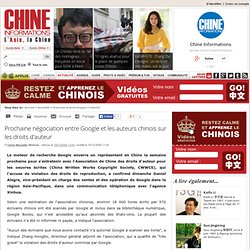
Selon une estimation de l'association chinoise, environ 18 000 livres écrits par 570 écrivains chinois ont été scannés par Google et inclus dans sa bibliothèque numérique, Google Books, qui n'est accessible qu'aux abonnés des Etats-Unis. La plupart des écrivains n'a été ni informée ni payée, a indiqué l'association. De son coté, M. Les abonnés d'Internet ne pourront que consulter ces livres sur Google. Ils ne pourront ni les lire ni les télécharger gratuitement, a-t-il ajouté. Google négocie avec les auteurs chinois-Le Quotidien du Peuple e. Google doit se sortir de l'épineux problème du respect des droits de propriété intellectuelle qui oppose le géant américain aux auteurs chinois.
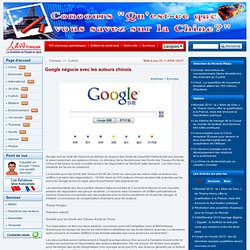
Le directeur de la Société pour les Droits des Travaux Ecrits de Chine a fait savoir qu'une nouvelle session de négociation se tiendrait cette semaine. Luo Nan nous présente les forces en présence. La Société pour les Droits des Travaux Ecrits de Chine ne vient pas les mains vides et amène ses chiffres à la table des négociations : 18 000 livres de 570 auteurs chinois auraient été scannés par les soins de Google et mis en ligne sans la permission des ayants-droits. La Chine avec les auteurs pour de nouvelles discussions avec Goo. Alors que Goggle se débat avec sa deuxième mouture de l'accord Google Book Search, la Chine manifeste à nouveau son mécontentement concernant les oeuvres précédemment numérisées sans accord des ayants droit.
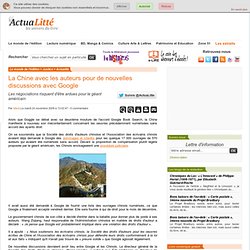
On se souviendra que la Société des droits d'auteurs chinoise et l'Association des écrivains chinois avaient déjà demandé à Google des dommages et intérêts pour les quelque 17 000 ouvrages de 570 auteurs qui avaient été numérisés sans accord. Devant la proposition de compensation plutôt légère proposée par le géant américain, les Chinois envisageaient une procédure judiciaire. Il avait aussi été demandé à Google de fournir une liste des ouvrages chinois numérisés, ce que Google a finalement accepté vendredi dernier. Elle sera fournie à qui de droit pour le mois de décembre. Le gouvernement chinois de son côté a décidé d'entrer dans la bataille pour donner plus de poids à ses auteurs. Un écrivain chinois porte plainte contre Google pour violation d.
Un écrivain féminin chinois accusant Google Chine de violation de copyright a déposé une plainte à l'encontre de la compagnie devant un tribunal de Beijing (Pékin). Mian Mian, célèbre romancière de Shanghai, a déclaré que le tribunal populaire du district de Haidian tiendrait une audience sur l'affaire le 29 décembre de cette année. "Google a voulu me faire valoir plus tôt qu'ils ne violent pas les droits d'auteur car ils n'affichent qu'une petite quantité du texte de mon livre, mais moi je pense qu'ils ont sérieusement porté atteinte à mes droits d'auteur," a expliqué Mian Mian au journal China Daily.
Selon Mian Google aurait numérisé son roman intitulé Acid Lover en entier, sans l'en aviser ni lui verser des droits d'auteur. Google Chine a depuis supprimé le roman de Miam de Google Books le 15 novembre, mais une recherche par mot-clé dans le moteur retournerait toujours des passages de son livre. Une romancière chinoise attaque Google Livres pour violation de. Condamné en France pour contrefaçon (décision dont il a fait appel), et surveillé de près aux Etats-Unis, Google Livres est cette fois dans le collimateur de la justice chinoise. Un tribunal de Pékin a été saisi d’une plainte déposée par la romancière Mian Mian qui reproche au géant américain d’avoir numérisé son roman Acid Lovers sans son accord. Elle réclame 6 100 euros de dommages et intérêts (61.000 yuans). Europe : réactions des éditeurs. Global Trade Talk: Global Reactions to the Revised Google Book S. Un Conseil des ministres européens de la Culture débat de la num. L'Europe veut une "doctrine commune" pour la numérisation des oe.
La réponse européenne à Google Books commencerait-elle enfin à prendre forme ?
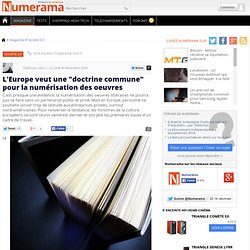
Vendredi dernier, les ministres de la culture de l'Union européenne se réunissaient à Bruxelles pour aborder l'épineuse question de la numérisation des œuvres littéraires. Objectif annoncé : uniformiser la législation en matière de numérisation et de droit d'auteur et définir un cadre de travail pour valoriser au mieux le patrimoine culturel européen. Christine Albanel chargée de mission... sur la numérisation - Nu. UK : réactions des libraires. L'Allemagne se dote d'une bibliothèque numérique. France : rejet du SNE. Mise à jour - L'AFP rapporte que le TGI de Paris a interdit à Google de poursuivre la numérisation d'ouvrages sans l'autorisation des éditeurs.
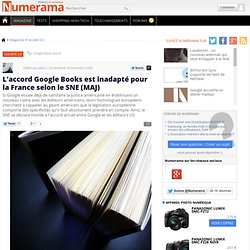
Selon Calimaq, le "tribunal a écarté l'application du droit américain (fair use)", bloquant ainsi les chances de Google de remporter le procès. Ramené sur le terrain du droit français, le géant américain a été condamné à verser 300 000 euros de dommages et intérêts et devra également s'acquitter d'une astreinte de 10 000 euros par jour, jusqu'au retrait complet de tous les éléments concernés. Article du 20 novembre - Alors que Google présentait en fin de semaine dernière une version revue et corrigée de son accord avec les éditeurs nord-américains, le Syndicat National de l'Edition (SNE) a tenu à publier un communiqué pour se rappeler au bon souvenir du géant américain et des autorités françaises.
Numérisation des livres : Frédéric Mitterrand espère "des soluti. L'édition française contre Google books : un verdict crucial - A.
Dans la presse US. Pamela Samuelson: New Google Book Settlement Aims Only to Placat. Just past midnight on a Saturday morning may be a fine time to go to a jazz club in New York City.
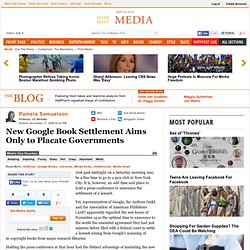
Google's book-scanning deal is not sealed yet. A scanner passes over a book last year as part of Google's digital project.
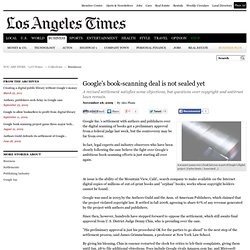
(Carlos Osorio / Associated…) Google Inc.' Google and the New Digital Future - The New York Review of Books. Books of The Times - In Googled, Ken Auletta Explores Company Open Book Alliance. As we have had 10 days to review GBS 2.0, the consensus from a broad community of stakeholders is clearly concern and disappointment at Google’s decision to make only minor modifications to the proposed settlement.
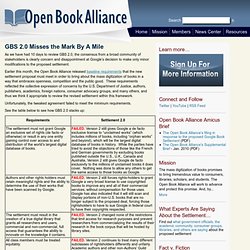
Earlier this month, the Open Book Alliance released baseline requirements that the new settlement proposal must meet in order to bring about the mass digitization of books in a way that embraces openness, competition and the public good. These requirements reflected the collective expression of concerns by the U.S. Department of Justice, authors, publishers, academics, foreign nations, consumer advocacy groups, and many others, and thus we think it appropriate to review the revised settlement within this framework.
Place des Creative Commons. Open Acces and Google Book Settlement. Impact sur Bibliothèques. The amended settlement has been issued (the best way to see the changes is in the redline version).
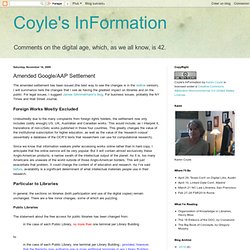
I will summarize here the changes that I see as having the greatest impact on libraries and on the public. For legal issues, I suggest James Grimmelmann's blog. For business issues, probably the NY Times and Wall Street Journal. Foreign Works Mostly Excluded Undoubtedly due to the many complaints from foreign rights holders, the settlement now only includes (oddly enough) US, UK, Australian and Canadian works. Since we know that information seekers prefer accessing works online rather than in hard copy, I anticipate that the online service will be very popular. GBS 2.0: The New Google Books (Proposed) Settlement. One of the basic indicators of successful negotiations is that each party leaves equally satisfied and dissatisfied.
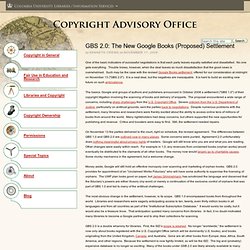
No one gets everything. Trouble brews, however, when the deal leaves so much dissatisfaction that the good news is overwhelmed. Such may be the case with the revised Google Books settlement, offered for our consideration at midnight on November 13 ("GBS 2.0"). It is a neat deal, but the negatives are inescapable. It is hard to build an exciting new future on such ambivalence. Revised Google Book Search Settlement from a Library Perspective. Late, late in the day last Friday, the principle parties in the Google Book Search case submitted a revised settlement agreement agreement to the court. This post takes a look at the changes to the settlement from a library perspective.
To keep this manageable, I’m not including discussion of library-oriented elements that haven’t changed; to read more about that I recommend the ALA/ACRL/ARL paper and/or previous posts on DLTJ. I’m also not including discussion on some aspects of the legal impact of the settlement (the appropriateness of setting policy via class action, the antitrust considerations of Google’s sole license to unclaimed works, etc.); for that I encourage browsing the writings of James Grimmelmann (any posting of his prefaced with “GBS” in the title). I will link off to some of the library-oriented discussion pieces of Grimmelmann and others in this post.
How We Got Here Even with the previous caveats, though, it is probably useful to review how we got to this point. Library Groups Point to Flaws in Revised Google Book Settlement- MAIN NEWS HEADLINES December 10 – December 17, 2009 Edition Library Groups Point to Flaws in Revised Google Book Settlement CHICAGO, IL/AUTHORLINK NEWS/December 9, 2009– The American Library Association, the Association of Research Libraries, and ALAs Association of College and Research Libraries have challenged Googles proposed settlement for its Book Search project with a guide describing the major flaws and concerns, particularly those relevant to libraries. Library associations raise Google Book Search pricing concerns t. Rep. Rush Holt (D-NJ) speaks at the IMLS briefing Recently, the Institute of Museum and Library Services (IMLS) sponsored a Congressional briefing titled “How Libraries Support Workforce Development.” The briefing featured several speakers from a variety of libraries and agencies that have seen firsthand the important role libraries have been playing in helping patrons find work and offering training to small businesses.
Rep. Google Book Project Settlement News. Library Journal reports that the American Library Association, the Association of Research Libraries and the Association of College and Research Libraries have joined in writing a letter to the Antitrust Division of the DOJ, in which they ask that department to actively supervise the Google Book settlement. Here is a link to the PDF of the joint letter. Censure. This is the fifth in a series of posts about the proposed Google Book Search settlement. As we've explained in earlier posts, when it comes to evaluating the proposed Google Books settlement, the principal potential benefit to the public (increased access to books online) must be weighed against the potential drawbacks (impediments to competition, inadequate protection for privacy).
Another potential downside for the public in the proposed settlement is the risk of censorship. To understand the importance of this risk, keep two things in mind. First, while bookstores are entitled to pick and choose their inventory, Google Books hopes to be much more than a simple bookstore. Débat sur la Privacy. Google Book Search Settlement Revised: No Reader Privacy Added. Late Friday night the parties to the Google Book Search class action submitted a revised settlement agreement to the federal court in New York that is hearing the case. Unfortunately, the parties did not add any reader privacy protections. The only nominal change was that they formally confirmed a position they had long taken privately that information will not be freely shared between Google and the Registry.
Our partners at the ACLU of Northern California have a blog post describing the changes we, and the authors we represent, have demanded and continuing the call for readers everywhere to let Google CEO Eric Schmidt know that reader privacy should not be left behind as books move into the digital age. The parties also asked for truncated notice and a rushed schedule with objections and opt-outs due on January 28, 2010 and a final fairness hearing on February 18, 2010. Débat/ Class Action. Blog: GBS: A Legislative Solution? (posted by Peter Hirtle) Many of the critics of the proposed Google Book Settlement (GBS) have pointed out that it attempts to use the class action mechanism to effect what should be a legislative prerogative.
James Grimmelmann’s amicus brief on behalf of the Institute for Information Law and Policy, for example, argues that the settlement “inappropriately attempts to solve a legislative problem through a class action settlement.” Most recently, Pamela Samuelson has recently written that “The GBS settlement contravenes core rule of law principles of our society.
To accomplish such an extraordinarily comprehensive restructuring of the future market for digitized books requires legislative action.” Oeuvres orphelines. Les experts consultés donnent raison aux détracteurs de l'accord Google books : le monopole de la firme californienne reste établi, rien à faire. Parmi les changements - humbles - apportés au règlement, le problème des oeuvres orphelines reste complet : ces textes encore sous droits, mais dont on ignore (ou ne parvient pas à retrouver) les ayants droit demeurent sous l'emprise de Google. GBS: Midnight Madness. The amended settlement dropped in the eleventh hour. Here’s a redline version and here’s the related memorandum with the procedural details. The best news coverage is the New York Times story; the best blog coverage is Danny Sullivan’s.
I’ve just completed a first pass through the amended settlement, tweeting all the way. GBS: Is the UWF a Blackwater for the Orphans? In a provocative blog post, Jane Litte analogizes the new Unclaimed Works Fiduciary to Blackwater, the mercenary-slash-goverment contractor. (Technically, I guess the UWF would be Xe, post-name change.) Her point is that the Registry will be performing a fundamentally governmental function but in a privatized way. If so, is the settlement akin to an act of privatized eminent domain? Débat / Lois antitrust. The revised Google Books settlement agreement may quiet international opponents, but it still gives Google a monopoly on commercializing out-of-print books where the copyrights are unclaimed and fails to protect consumer privacy, opponents said on Monday. "We're at a cross roads," Internet Archive Director Brewster Kahle said during a panel late Monday on the Future of Books at the Commonwealth Club in San Francisco.
"Is it going to be a subscription life...where one or two companies own the distribution and presentation (rights) to these books? " In response, Google Books Engineering Director Dan Clancy said: "This is just one of a panoply of choices that people will have in the future. " Google is scanning and digitizing books in libraries and publishers' catalogs so people can view and search them online and buy electronic versions. Open Book Alliance. Google Books Settlement 2.0: Evaluating Competition. Open Book Alliance. Débat/Oeuvres étrangères. Débat / Fair Use.
Texte du nouveau règlement. Modifications to the Google Books Settlement. Comparaison avec l'ancien règlement. Détails des modifications. The Author's Guild et al v. Google Inc. - 1:2005cv08136 - Justia. Pour comprendre... vite... Résumé/Nouveau règlement. FAQ/Nouveau règlement. FAQ / National Writers Union. Guide for the perplexed. Le nouvel accord de règlement... Final notice of Class Action Settlement.
GBS: Preliminary Approval. Objection d'Amazon/procédure. Amazon asks judge to reverse approval of new Google deal. Judge rejects Amazon bid to derail new Google book pact.